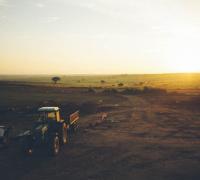Sustaining peace in natural resource conflicts
Recent research has suggested that food security interventions contribute to sustaining peace by reducing tension and strengthening livelihoods through resilience approaches. However, evidence is limited for whether and how current food security interventions make this contribution, particularly in areas characterised by unresolved land and water disputes, interethnic tensions, competition for land, water and economic opportunities as well as the presence of militias or other armed groups.
These characteristics are often considered key obstacles to sustaining peace in post-conflict societies, but are arguably also key entry points for making an effective contribution to conflict prevention. In the context of conflict, perceptions, expectations and subjective beliefs are critical for driving behaviour such as displacement and also interactions with state and state-like actors, as well as for social cohesion.
DIIS researchers gave three presentations on different areas of resource conflicts to a broad group of FAO staff during a seminar in Rome on 23 June organized by the FAO Resilience Programme Management Team:
Impact of forestry interventions on land conflicts and land tenure in Eastern Africa (Esbern Friis-Hansen and Rasmus Hundsbæk Pedersen).
This presentation is based on an ongoing research program into private tree-planting in Tanzania, the Timber Rush programme, but it will be drawing on wider research into natural resource investments in Eastern and Southern Africa. It is engaging with the land and resource grabbing literatures, which emerged at the height of the spike in global commodity prices a decade ago, but later on ventured into different directions with more focus on including other types of dynamics, conflicts and actors into the analyses. The Timber Rush looks into investment dynamics in the Southern Highlands of Tanzania, where afforestation is taking place on village land and driven by domestic actors, that is, Tanzanian investors from urban centres and by resourceful rural people. Which potential and which conflicts do this type of natural resource rush produce? What are the implication of peace and food security? The presentation furthermore points to the importance of institutional innovations required to accommodate contemporary investment dynamics.
Water-related conflict and cooperation: causes and implications for food security and sustainable peace in areas of protracted crises (Helle Munk Ravnborg)
Water security is profoundly affected in areas of protracted crisis. Whether caused by natural or climate-related disasters or political conflict, access and rights to water for domestic and productive purposes for the local population as well as for newcomers are at stake. Moreover, efforts to promote food security through agricultural interventions almost inevitably further affect water availability, rights and distribution, e.g. through associated water development, through encouraging changes in water use and through water governance reform.
This presentation is based on a systematic mapping of water-related conflict and cooperation in five districts in Bolivia, Nicaragua, Mali, Zambia and Vietnam, conducted as part of the Competing for Water research programme, coordinated by DIIS, and a detailed mapping of the implementation of the Nicaraguan water governance reform in the context of inequality with a specific focus on water rights for irrigation, conducted as part of the Territorial Cohesion for Development programme, coordinated by Rimisp. The presentation identifies factors, which are found to be associated with or lead to (rural) water-related conflict and cooperation presentation, and discusses the implications for efforts to promote food security (SDG2), water security (SDG6) and peaceful and inclusive societies (SDG16).
Impact of climate change adaptation interventions on natural resource conflicts (Mikkel Funder)
The connections between climate change and conflict have been the subject of much debate and numerous studies. Yet one aspect that has received less attention is how efforts to support climate change adaptation in themselves influence natural resource conflicts and governance. This is critical to understand, partly to ensure that such adaptation interventions actually succeed, and partly to ensure that they do not trigger, exacerbate or re-ignite conflicts. Drawing on research in Zambia under the Climate Change and Rural Institutions research programme, this presentation will discuss how efforts to support adaptation to floods, drought and changing rainfall interact with conflicts over land access and land control. It will describe the role of state institutions, local governments and customary authorities in this respect, and how farmers respond. On this basis, the presentation will discuss key factors that climate change adaptation interventions must take into account if they are to support peaceful natural resource use and governance.
DIIS Experts





